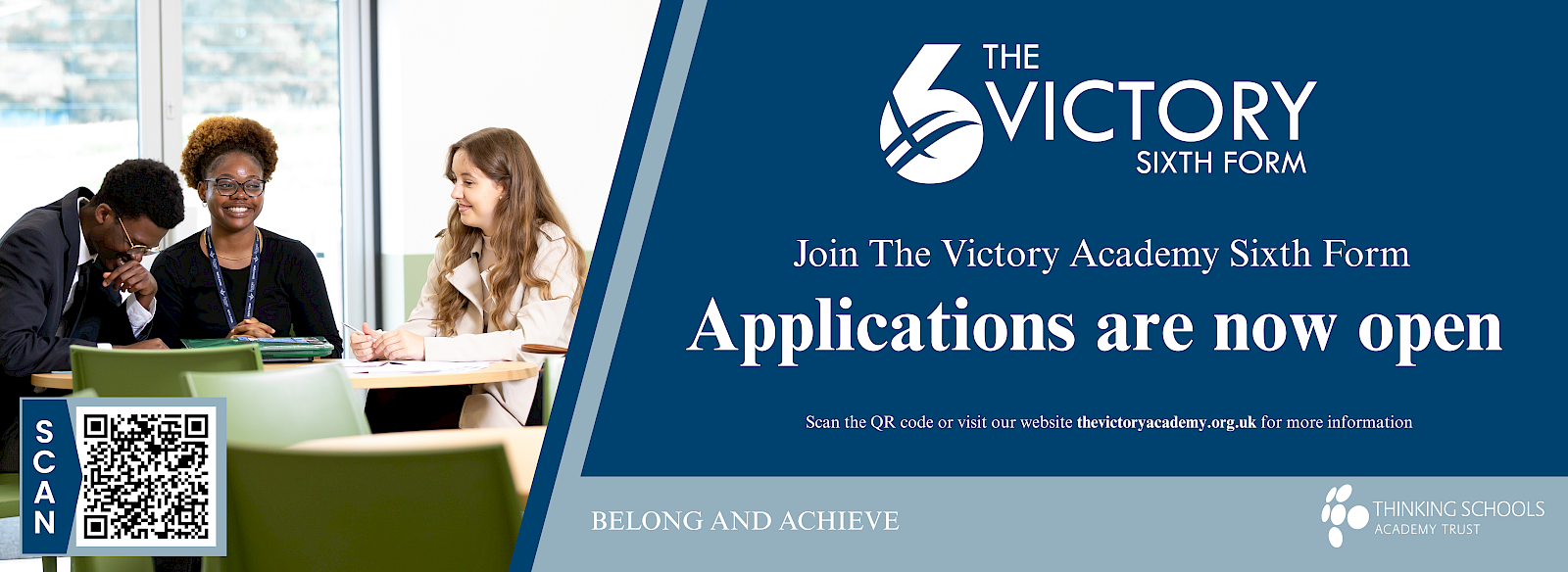
Applications for The Victory Academy Sixth Form are now open! To apply please click here.

Applications for The Victory Academy Sixth Form are now open! To apply please click here.
The Performing Arts department at The Victory Academy aims to prepare confident, creative and skilled practitioners through developing an awareness and appreciation for the varied cultural and practical skills within a diverse programme of study. Applying theoretical and practical approaches, we explore Dance, Drama, Music, Technical Theatre and Music Technology; encouraging students to step out of their comfort zone and into other’ shoes to develop the transferable skills of imagination, self-awareness, critical thinking and communication in a unique and culturally diverse way.
We support students to pursue their ambitions and goals across all avenues within Performing Arts, nurturing resilience, creativity, empathetic and personal management skills alongside exploring a wide range of historical periods, genres, cultures and traditions to hone their own practical and analytical skills. Students create their own work, inspired by world-renowned composers, choreographers and directors; developing an appreciation for how early pieces are relatable to the lives we know today. Our aim is for students to develop into self-aware, vocal and socially responsible individuals; able to critically assess and establish their role in society as emotionally intelligent individuals.
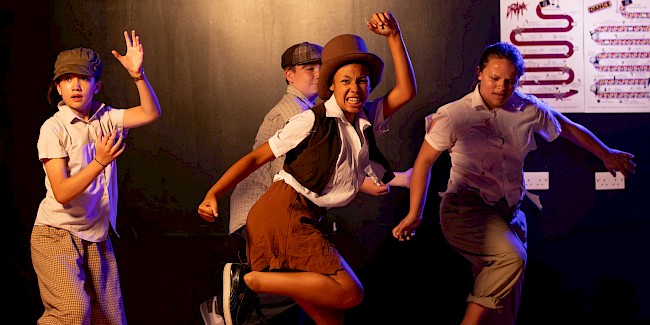
Performing Arts is about passion, self-discipline, self-expression and creativity. Our aspirational aim is for students to share the belief that performing arts helps to shape change within our community and worldwide, with power to influence change and provide a voice for and expression of all facets of life.
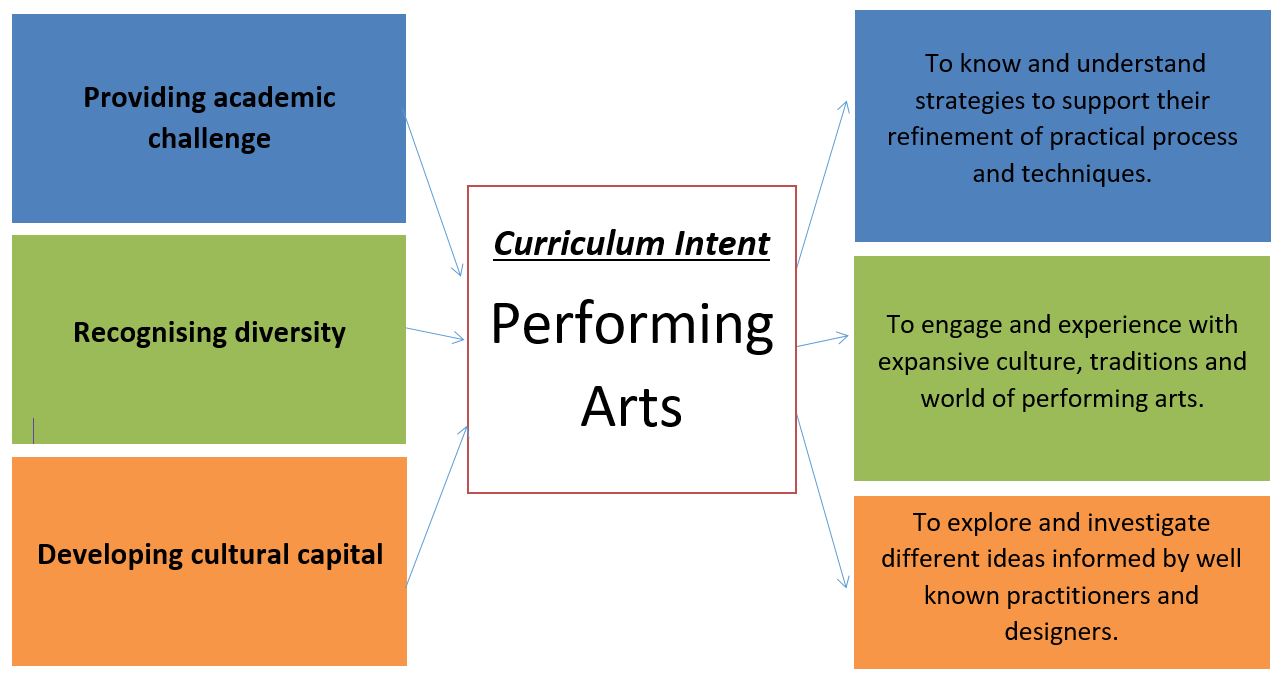
Students will study all three disciplines within the Performing Arts; Dance, Acting and Music. Students will explore a range of genres, choreographic ideas and styles, with an aim to gain confidence, performance skills and dance technique. Within Drama, students will develop and explore many different drama elements through practical skills focusing on vocal and physical techniques. Within Music, we engage students to develop a passion of music and develop their talents and skills through practical and theory lessons in a wide range of historical periods, genres, styles and traditions, using the works of famous composers and musicians. The students will gain self-confidence in, creativity, composition skills, instrumentation and how early Music is still relatable to the music heard today. All schemes of work, focus on different styles, genres, approaches and support students when deepening their knowledge and level of understanding of the Arts as a whole.
Performing Arts is about passion, self-discipline, self-expression and creativity.
Students will be taught:
Dance Curriculum Content
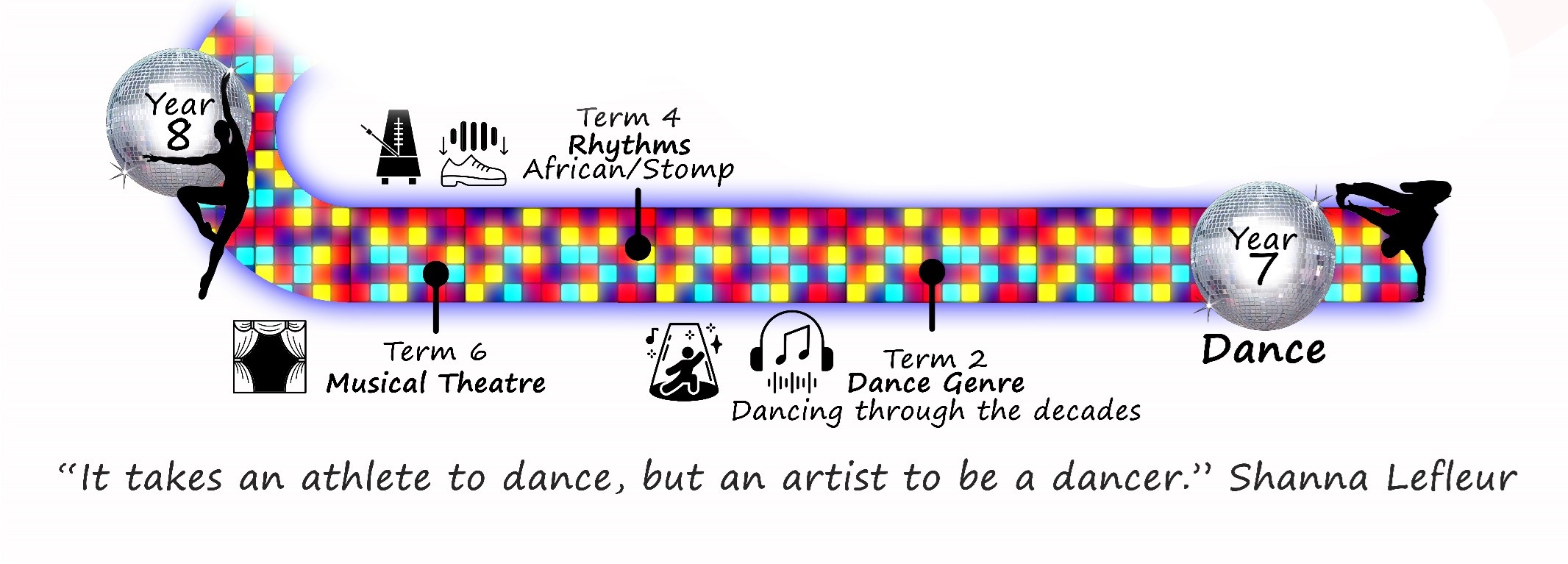
Drama Curriculum Content
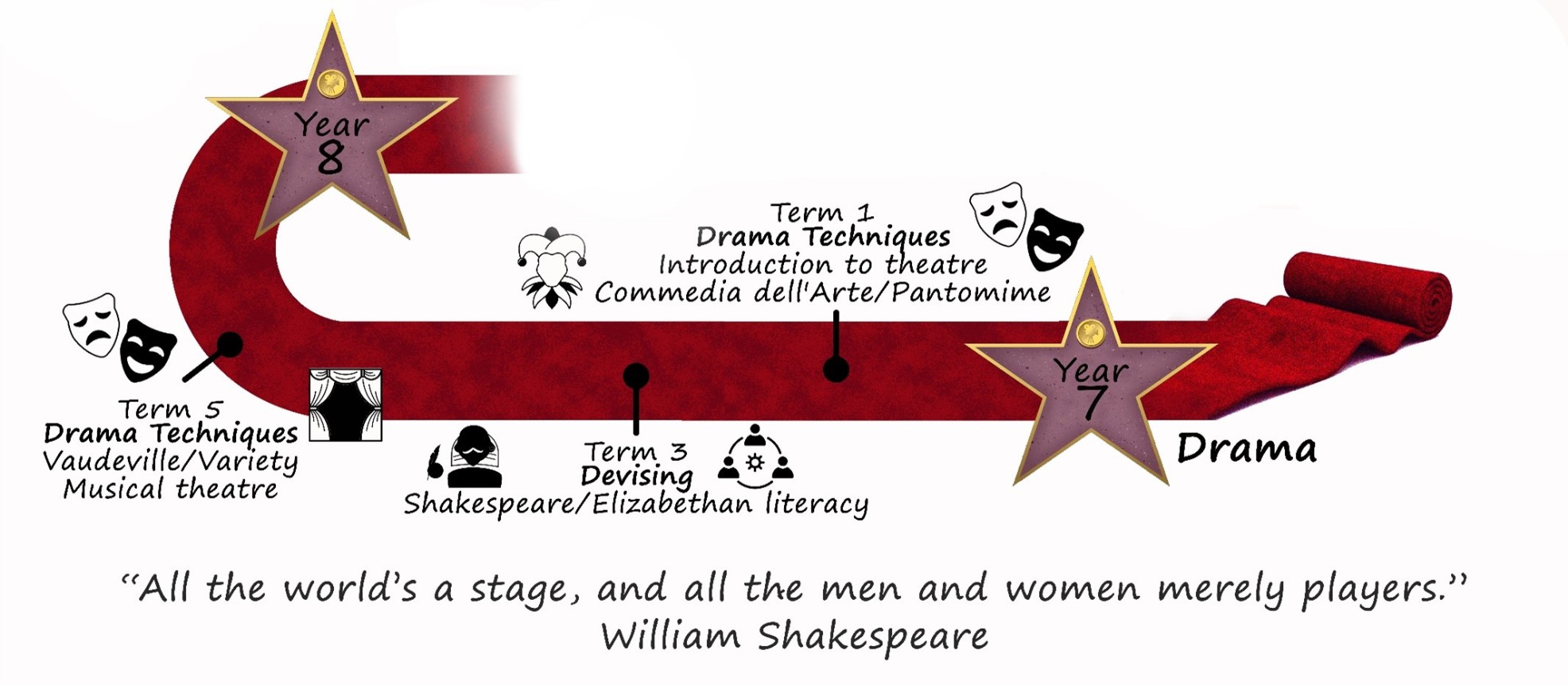
Music Curriculum Content
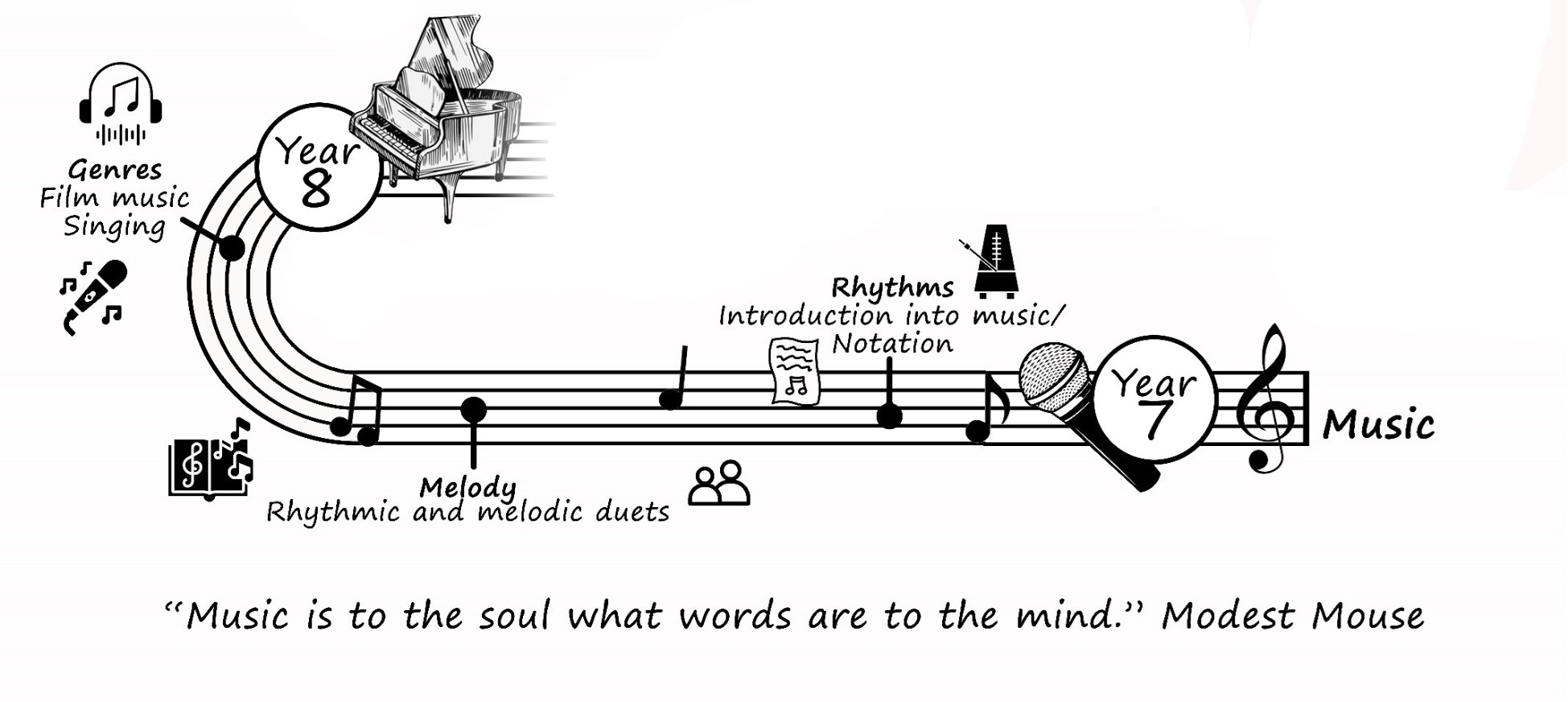
Studying cultural education subjects, such as dance, drama and music, sparks creativity across the curriculum. We encourage students to be inquisitive, disciplined and determined. Within year 7 students work on a carousel in Dance and Drama in which they will study each discipline three times a year. and Music is studied once every two weeks. This will give students insight on all pathways and topics within the Performing Arts. Students will build on their confidence, creativity and organisation.
Dance- Within Dance students, study a wide range of different genres. This encourages students to step outside the box, learn about different cultures and practitioners and challenges them within their learning. Students will work within groups and will perform their work created. They will be assessed each term in the following areas; Knowledge, Creativity, Performance and Evaluation. Topics students will be studying within dance are; Dancing through the decades, African Dance and Musical Theatre. These topics are focused on practitioners within each genre and allow students to build on their subject knowledge as well as their choreographic skills.
Drama- Similarly to Dance, Drama will also cover a wide range of topics to develop students understanding of stage acting, screen acting and the history of. Students will engage in; Commedia Dell’Arte, Pantomime, Shakespeare, vaudeville, Variety and Musical Theatre Students will be assessed in the same areas however acting will have a more tailored pathway.
Music- Music is a universal language that embodies one of the highest forms of creativity. Music should engage and inspire students to develop their love and passion for music and their talents as musicians. Music builds on self-confidence, hand eye coordination, creativity and self-discipline. It allows to students to express themselves in different ways other than speaking. Some of the topics studied in music are; Introduction to Music, Rhythmic and Melodic Duets, Film Music and Singing. This will develop a foundation of understanding of performance, composition, structure and Instrumentation.
Dance Curriculum Content
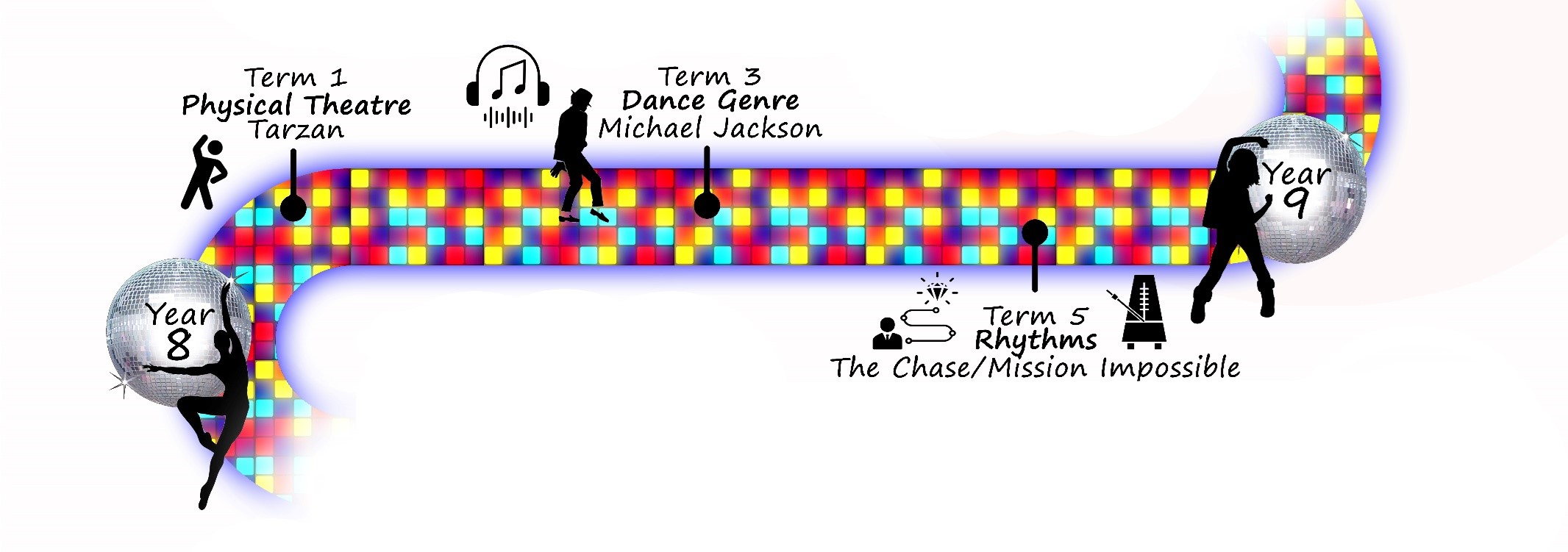
Drama Curriculum Content

Music Curriculum Content
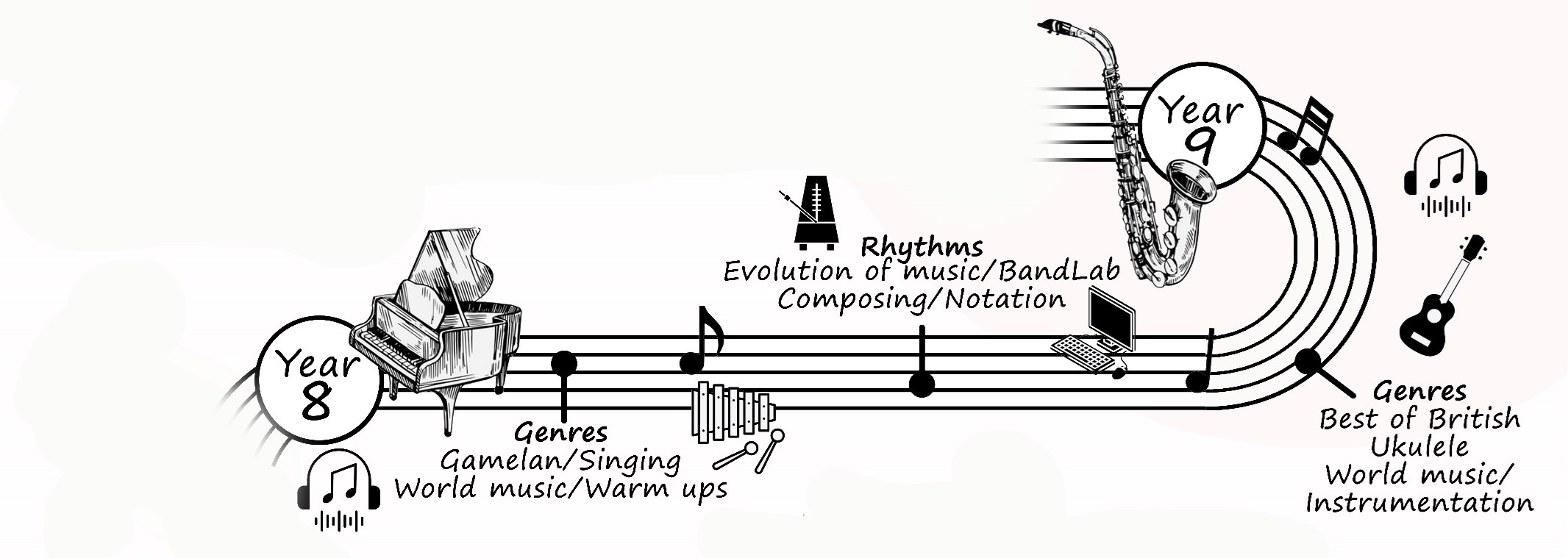
In Year 8, students continue to develop their creativity, confidence, and technical skills across Dance, Drama, and Music. Building on their Year 7 experiences, they explore a wider range of performance styles and traditions, while also learning how to work more independently and collaboratively. Dance and Drama are taught on a carousel three times a year, and Music is delivered once every two weeks. This varied programme gives students the opportunity to grow as well-rounded performers, creators, and critical thinkers.
Dance- Students explore a range of styles and techniques to improve both performance and choreography skills. They will develop expressive movement and storytelling through Physical Theatre, study the unique performance style of Michael Jackson, and perform high-energy routines inspired by soundtracks such as The Chase and Mission Impossible.
Drama- Students develop stagecraft, characterisation, and ensemble performance through a mix of modern and classical material. They will perform scenes from Bugsy Malone and The Great Gatsby and explore the history and performance conventions of Morality Plays and Greek Theatre. This balance of practical work and historical context helps students understand how theatre has evolved.
Music- Students extend their musical knowledge and practical skills through performance, composition, and listening. They will perform traditional Gamelan music, strengthen their vocal technique through warm-ups and singing, explore the Evolution of Music using Bandlab to compose and arrange, and study the Best of British to celebrate influential home-grown artists and styles.
Dance Curriculum Content
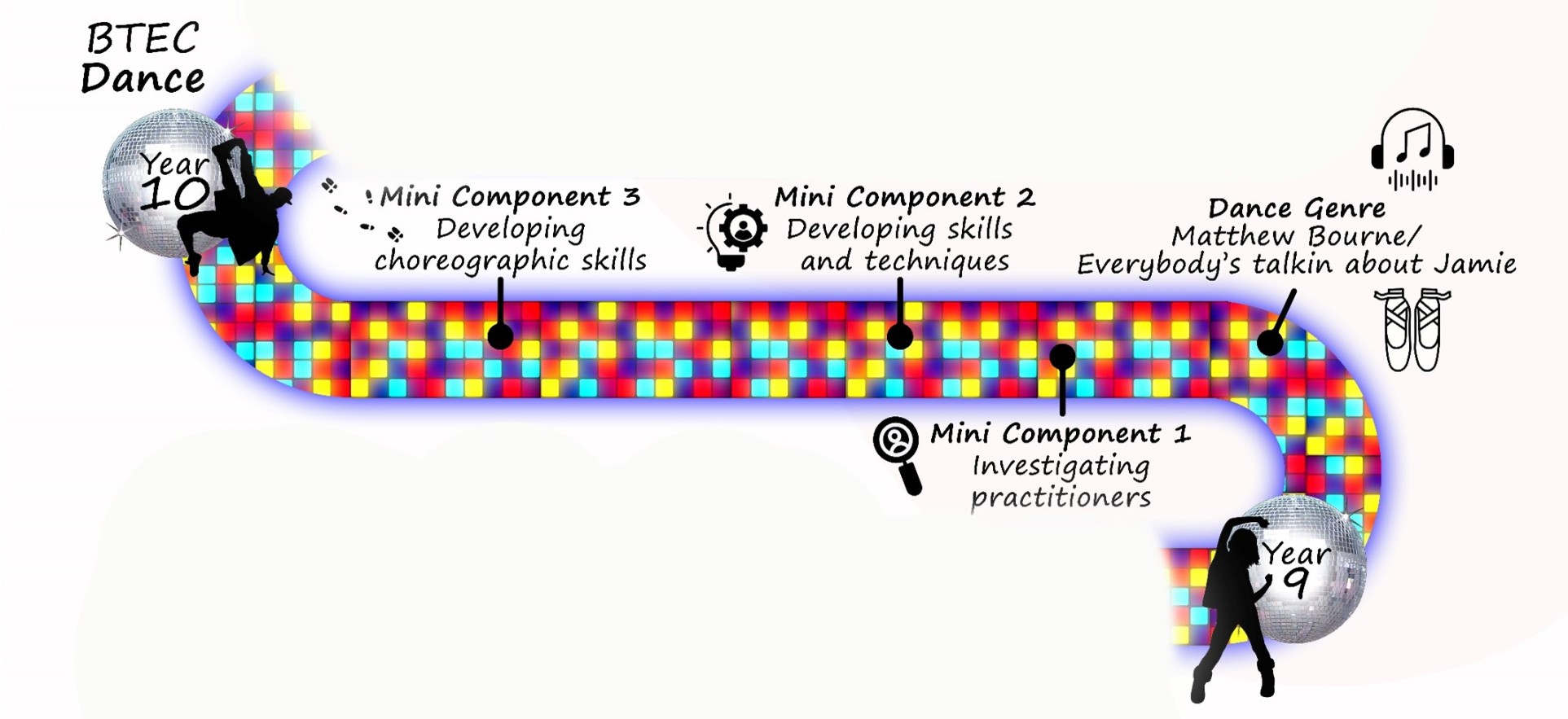
Drama Dance Curriculum

Music Curriculum Content
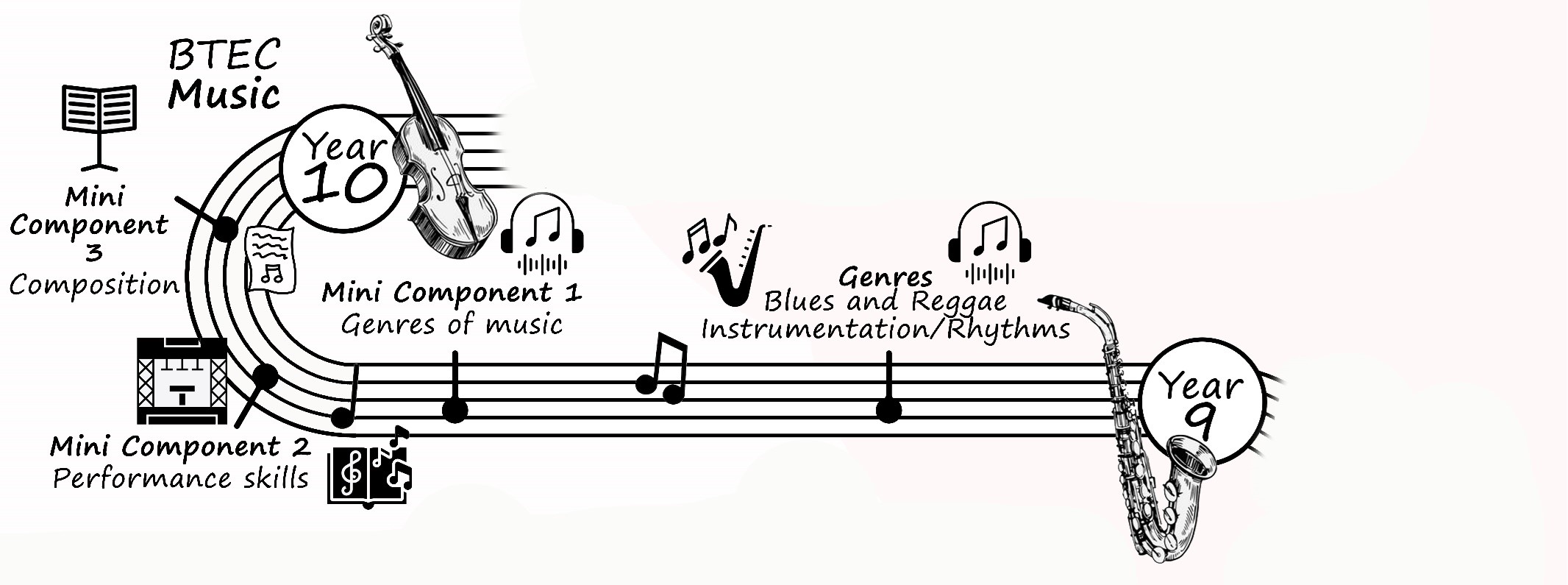
The Performing Arts curriculum prepares students to become independent and creative individuals. Subjects promote an overall appreciation of the arts both inside and outside of the classroom developing discipline, control and focus allowing them to grow into well rounded adults. Within year 9, students will rotate within three areas; Performing Arts, Arts Award and Music. This will allow students to get experience in all areas and have a wide range of knowledge and understanding about the Arts, not only on stage, but behind the scenes. This pathway allows students to have a real insight on careers within the Arts and have an in depth understanding about there this could lead them in the future. At the end of Term 3, students will be set into 3 different groups which will give opportunity for students to have a deeper understanding and foundation on a possible chosen subject for Key Stage 4.
Within the Performing Arts pathways, students will be studying a wide range of practitioners. They will look at the history of how that practitioner became who they were and what they are known for, the style and genre of that practitioner and look at performance works. Students will study musical theatre as a whole and will have insight on Dance, Drama and Music both separately and as one. Students will also be assessed on both practical and theory work within this area.
In Year 9, students undertaking the Dance pathway will follow a structured curriculum designed to introduce the knowledge and skills required for the BTEC Tech Award in Dance. They will study professional works such as The Nutcracker and Everybody’s Talking About Jamie, developing analytical skills by examining how choreographers and performers communicate themes and intentions through movement. Students will focus on the skills and techniques of a performer, with particular attention to physical, technical, and expressive qualities, as well as the application of safe practice. Choreographic skills will be embedded through practical tasks that require students to respond creatively to a variety of stimuli, while also exploring the work of key practitioners and significant dance performances, some of which will be recreated to build understanding of professional repertoire. Learning will be organised into mini-components modelled on the BTEC Tech Award assessment framework, ensuring students are well prepared for the demands of the qualification at Key Stage 4.
In Year 9, students undertaking the Drama pathway will engage with a curriculum designed to prepare them for the requirements of GCSE Drama. They will explore a variety of theatrical styles and forms, including Verbatim Theatre, while studying set texts such as Blood Brothers and other selected plays to develop skills in script analysis, interpretation, and performance. Devising will form a central part of the curriculum, with students creating original work in response to a range of stimuli to strengthen creativity, collaboration, and problem-solving skills. In addition, students will develop performance skills through the study and staging of duologues, focusing on vocal and physical characterisation as well as interpretative choices. Learning will be structured through mini-components that reflect the assessment style of GCSE Drama, enabling students to gain early experience in both practical performance and evaluative reflection. This ensures they are equipped with the core knowledge and skills necessary for success at Key Stage 4.
Within the Music pathway, students will be studying the theory behind music. They will be deepening their knowledge, looking at the history of practitioners, music styles, the wide range of instruments and the commonalities in music then with music we hear today. Students will be looking at Blues, Reggae, Performance and compositional skills alongside the music technology route such as; sampling, looping and producing. This will allow students to establish where their strengths are within music and will encourage them to take the next time within key stage 4.
In terms 4,5 and 6 once students have been placed into their 3 set groups to deepen their understanding, they will look at completing mini versions of study from KS4.
Students receive regular verbal and formative feedback to enable them to develop their skills across each discipline and will also complete a summative assessment at the end of each term. Summative assessments will take the form of students creating a series of experiments and a final piece which will be reflected on throughout projects and a grade will be fed back at the end. All students will be taught to analyse and evaluate their own work and the work of others in order to strengthen their outcomes. They are expected to know, apply and understand the matters, skills and processes specified in the programme of study.
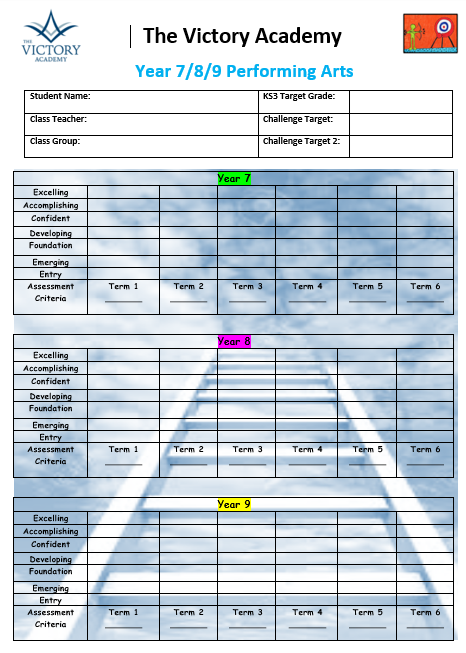
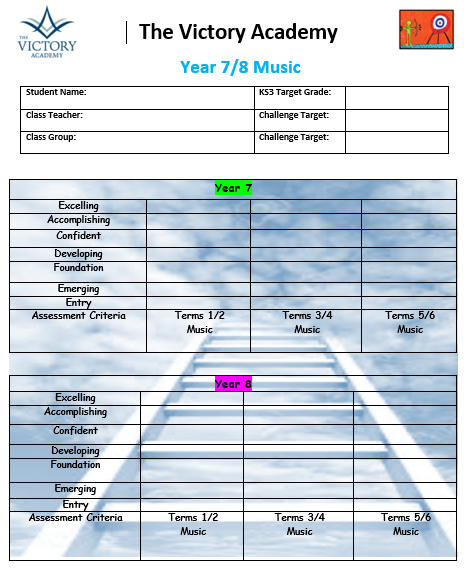
We provide a rich extracurricular activities programme and regular afterschool workshops to provide opportunities to develop creativity and an understanding of creative and improvisational skills. We celebrate the arts through the organisation of trips, workshops, Festivals and competitions to provide students with a rich Arts experience.
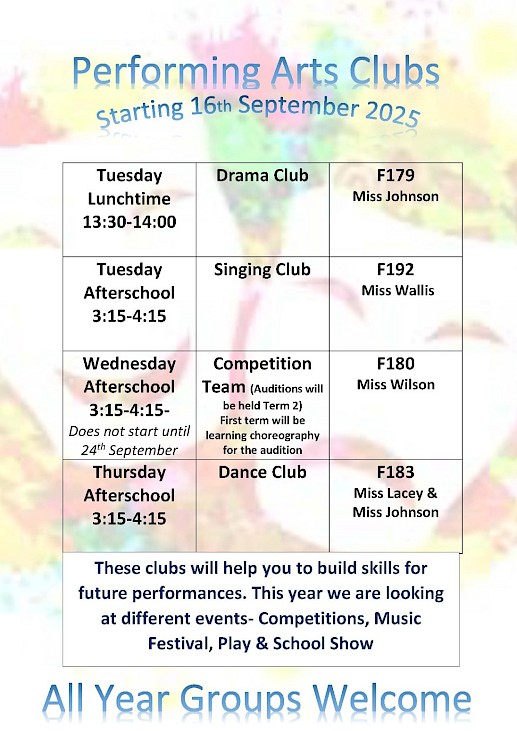
| Course Title | Qualifications Obtainable | Awarding Body |
|---|---|---|
| Key Stage 4 Courses | ||
| BTEC Tech Award in Performing Arts (Dance approach) | GCSE | Pearson |
| BTEC Tech Award in Music Practive | GCSE | Pearson |
| GCSE Drama | GCSE | Eduqas |
Year 10 and Year 11 - Dance Curriculum Content
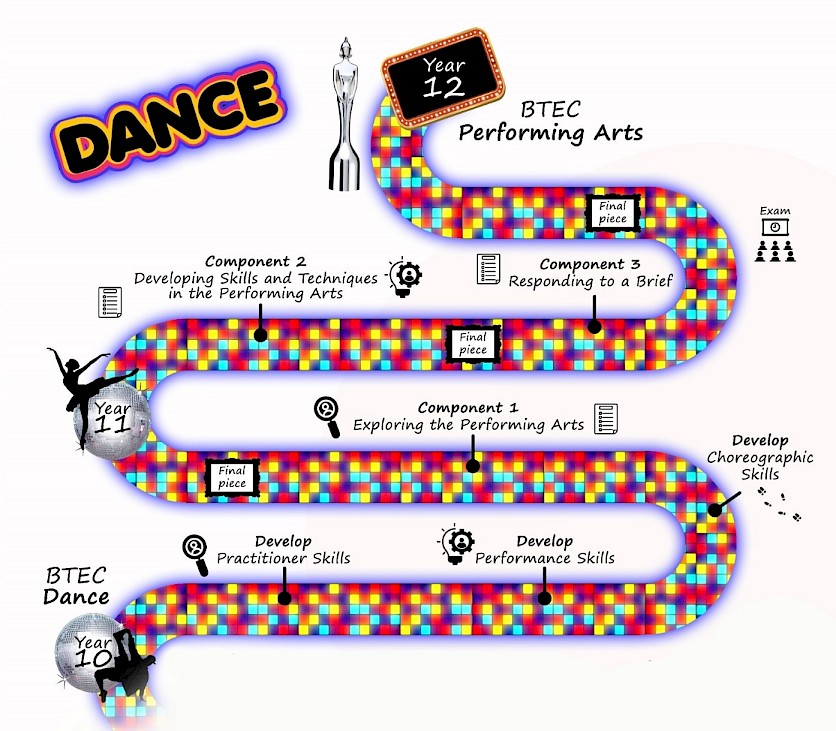
Students studying the BTEC Tech Award in Dance will develop a broad understanding of the performing arts through the study of a range of professional practitioners and styles, including the distinctive jazz choreography of Bob Fosse, the hip-hop theatre of ZooNation, and the contemporary urban dance of Boy Blue. They will refine the skills and techniques of a performer, such as strength, flexibility, timing, musicality, focus, and projection, applying these to both rehearsal and performance contexts. As part of their practical learning, students will recreate extracts from significant professional works, enabling them to gain insight into performance demands and stylistic features of different choreographers. Alongside this, they will build their choreographic skills by creating original dance pieces in response to a stimulus, developing creativity, individuality, and the ability to communicate intention through movement. This combination of analysis, performance, and creative exploration ensures students are fully prepared for the demands of the qualification while experiencing the breadth and diversity of dance as an art form.
Year 10 and Year 11 - Drama Curriculum Content
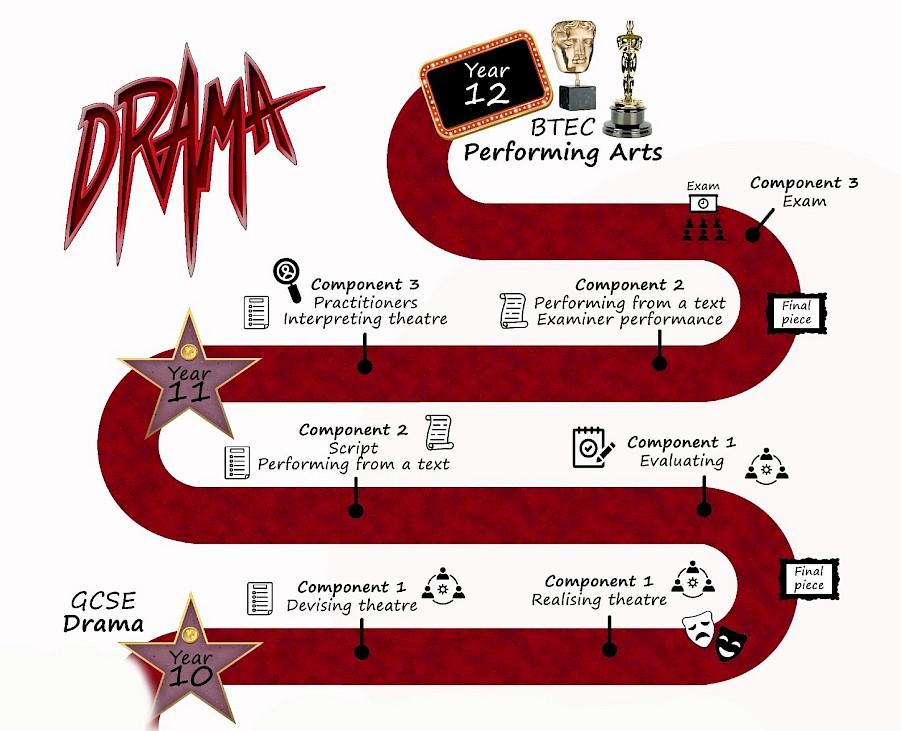
Students studying GCSE Drama will engage with a balanced curriculum that develops practical performance skills alongside analytical and evaluative understanding of theatre. In Component 1, they will devise original drama in response to a stimulus, applying creativity, collaboration, and performance techniques while documenting and reflecting on their process. Component 2 focuses on the interpretation and performance of extracts from a set text, where students will refine vocal and physical skills such as characterisation, timing, movement, and use of space to communicate meaning to an audience. In Component 3, students will sit a written examination that assesses their ability to analyse and evaluate live theatre productions as well as demonstrate their understanding of a set drama text from the perspective of a performer, director, and designer. This combination of devising, performing, and written evaluation equips students with the skills, knowledge, and confidence required for success in the subject at Key Stage 4 and beyond.
Year 10 and Year 11 - Music Curriculum Content
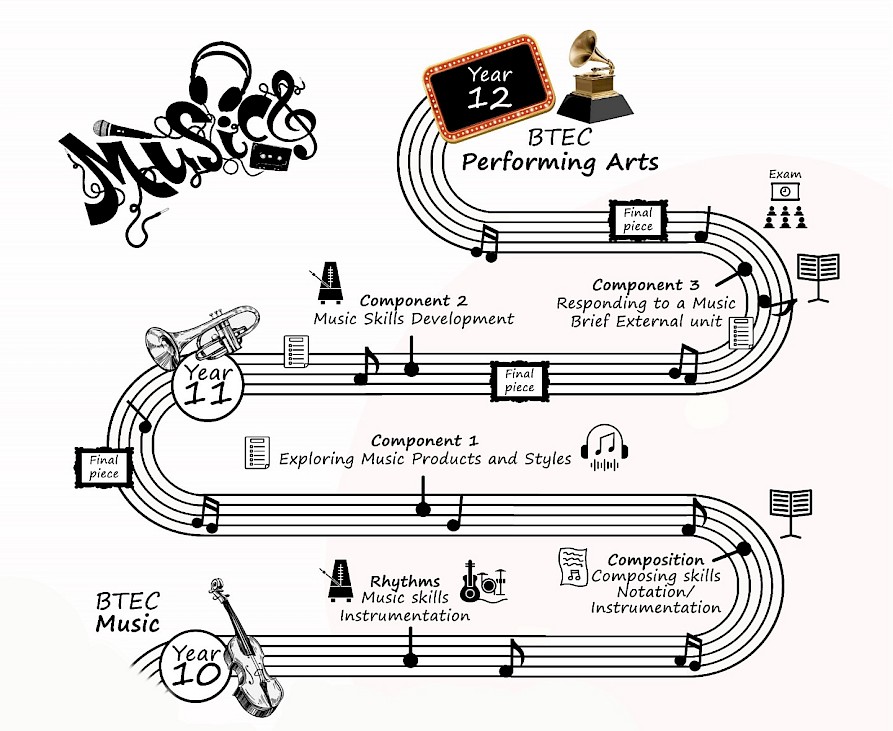
Students studying the BTEC Tech Award in Music will gain a practical and theoretical understanding of the music industry through a curriculum that combines performance, composition, and music technology. They will develop their skills as performers by working on solo and ensemble pieces, focusing on accuracy, expression, and communication with an audience. Composition skills will be built through creative tasks that require students to respond to a variety of musical stimuli, developing originality and stylistic awareness. Students will also explore music production techniques, learning how to use technology to create, edit, and refine their work. Alongside practical elements, the course provides insight into different areas of the music industry, including roles, organisations, and career pathways. Through assessment tasks modelled on the BTEC framework, students will experience realistic scenarios that reflect professional practice, ensuring they are well prepared for progression to further study or future careers in the music sector.
Students receive regular verbal and formative feedback to enable them to develop and record their ideas, combining practical performance, creative exploration, and theoretical understanding. Across all pathways, students develop essential skills such as confidence, communication, teamwork, and creativity, which have a lasting impact both academically and personally. Student’s coursework are assessed internally and externally by the exam board.
| Course Title | Qualifications Obtainable | Awarding Body | A Level Equivalent |
|---|---|---|---|
| Key Stage 5 Courses | |||
| BTEC National Extended Certificate in Performing Arts | BTEC Level 3 | Pearson | Equivalent to 1 A Level |
| BTEC Foundation Diploma in Performing Arts | BTEC Level 3 | Pearson | Equivalent to 1.5 A Levels |
| BTEC National Diploma in Performing Arts | BTEC Level 3 | Pearson | Equivalent to 2 A Levels |
The BTEC Extended Certificate- 1 A-Level
The BTEC Extended Certificate is a one-year course equivalent to one A-level, designed for students seeking focused study in performing arts. It introduces learners to key performance and creative skills, combining practical and theoretical learning. Core units include Investigating Practitioners’ Work (developing analytical skills and understanding of professional styles), Developing Skills and Techniques for Live Performance (enhancing physical and vocal control, spatial awareness, timing, and expression), and Group Performance Workshop (collaborative creation of ensemble pieces in response to a stimulus). Through these units, students refine their performance, choreography, and creative problem-solving abilities, while gaining experience in reflective practice. The course equips learners with a strong foundation in performance and prepares them for further study or progression to more extensive Level 3 courses.
The BTEC Foundation Diploma- 1.5 A-Levels
The BTEC Foundation Diploma is a two-year course equivalent to two A-levels, offering a broader and more in-depth study of performing arts. In addition to the core units from the Extended Certificate, students explore Performing Arts in Practice (planning, rehearsal, and delivering performances to professional briefs) and Individual Performance Commission (developing independence and original creative work). Specialist units include Street Dance Technique (precision, rhythm, and commercial dance style), Jazz Dance Technique (flexibility, alignment, and stylistic interpretation), and Acting for Stage (vocal projection, movement, characterisation, and emotional truth). Students also study units such as Leadership and Entrepreneurship in the Creative Arts, enhancing organisational, project management, and professional skills. This course develops a wider skill set, enabling learners to perform confidently in both collaborative and solo contexts, and provides progression into the National Diploma or higher education.
The BTEC National Diploma- 2 A-Level
The BTEC National Diploma is the most extensive Level 3 course, equivalent to three A-levels, offering comprehensive vocational training in performing arts over two years. It encompasses all units from the Foundation Diploma while adding additional specialisms to provide an in-depth, industry-relevant experience. Students study advanced units including Final Live Performance to an Audience, integrating rehearsal discipline, technical performance skills, and evaluative reflection. They also undertake further specialist training across performance styles, developing mastery in both dance and acting techniques, while Leadership and Entrepreneurship in the Creative Arts prepares them for roles within creative projects or production management. The course emphasises professional practice, reflective evaluation, and transferable skills such as teamwork, resilience, and problem-solving. Graduates are fully prepared to progress to higher education, conservatoires, or employment within the performing arts and wider creative industries.
Year 12 and Year 13 - Curriculum Content
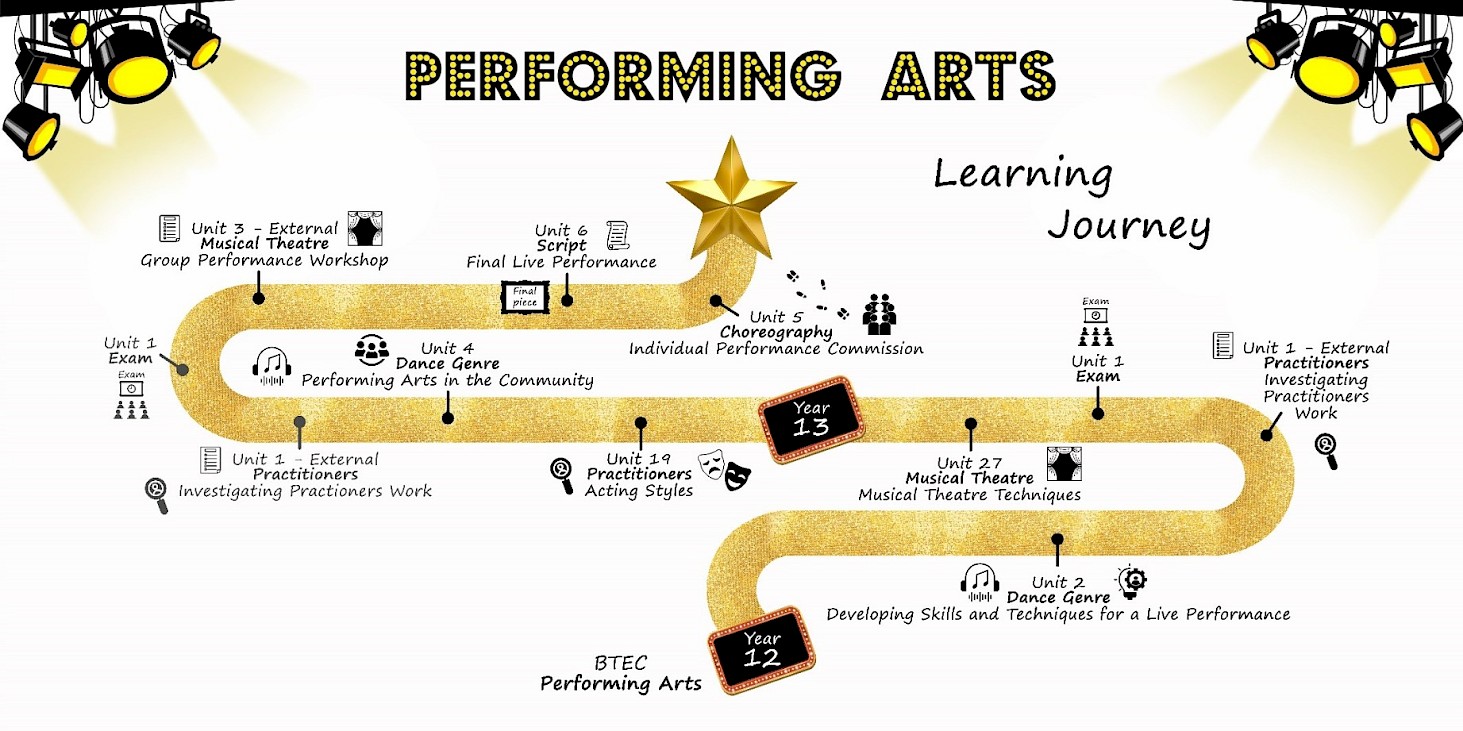
Studying Performing Arts at Key Stage 5 has a significant and lasting impact on students, both academically and personally. Learners develop advanced technical and creative skills in dance, drama, and music, including performance technique, choreography, characterisation, musicality, and expressive communication. Beyond practical abilities, the curriculum fosters essential transferable skills such as confidence, teamwork, leadership, problem-solving, resilience, and self-discipline, which are highly valued in higher education and the workplace. Regular practical assessments, reflective practice, and feedback enable students to evaluate their own work and that of others, promoting critical thinking and self-improvement. Exposure to professional practitioners, industry-standard techniques, and live performance opportunities further inspires ambition and a deeper understanding of the creative arts sector. Overall, the KS5 Performing Arts experience equips learners with the knowledge, skills, and mindset necessary to succeed in further study, vocational training, or employment within the performing arts and wider creative industries.
The UK’s creative industries are developing new jobs faster than other sectors and we pride ourselves on keeping up to date with the latest advances and technologies. The creative industries generate more than £100 billion a year to the UK economy and employ more than 2 million people. About 1 in 8 UK businesses are in the creative industries, with an estimated 2,040,000 jobs. There is a high demand for creative thinkers in all sectors. These skills go beyond what is needed to achieve at exam level and focus on equipping our students with the ability to be to be creative, to organise, to reflect and to self-improve.
Studying Performing Arts provides students with a wide range of pathways into higher education, vocational training, and employment within the creative industries. Through the development of technical skills, creative problem-solving, teamwork, leadership, and professional practice, learners are well-prepared to progress to conservatoires, university-level study, apprenticeships, or industry-based training. The practical and analytical skills gained through performance, choreography, devising, music composition, and production are highly transferable, equipping students for careers both on stage and behind the scenes. Students are also encouraged to develop entrepreneurial awareness, understanding how to manage projects, promote their work, and pursue freelance opportunities. The subject fosters resilience, adaptability, and confidence, ensuring that learners are well-positioned to succeed in competitive and dynamic creative environments.
Possible Careers in Performing Arts
Performance:
Creative & Production Roles:
Education & Community:
Creative & Industry Opportunities:
https://www.artscouncil.org.uk/
Learn & explore | National Theatre
Subjects and Careers - Federation of Drama Schools
CDMT – Council for Dance Drama and Musical Theatre
Careers, opportunities and advice | National Theatre
Homepage | London academy of music & dramatic art
ucas.com/explore/subjects/performing-arts
The Stage - The Stage | UK Theatre News, Reviews, Interviews & Jobs
Conversations on Dance- Interviews with dancers, choreographers, dance History and career advice
The Making Theatre Podcast- Hosts who are lighting designers talk to actors, directors, designers, stage managers, technicians etc., about what goes into making theatre.
MusicalSplaining- Discussions of musicals — their plots, themes, productions etc.
UK Theatre Podcasts- Interviews, reviews, what's going on in UK theatre.
The Dance Podcast- Conversations with dancers doing different things in their careers, sharing experiences, ups and downs.
ARTISTIC MINDS- Arts & culture conversations, including theatre, dance, music; how artists think, create, respond to society.
Dance Research Journal (DRJ)- Dance Research Journal | Cambridge Core
Research in Dance Education- Research in Dance Education | Taylor & Francis Online
Studies in Theatre and Performance- Studies in Theatre and Performance | Taylor & Francis Online
Music Education Research- Music Education Research | Taylor & Francis Online
Music Theory Online (MTO)- Music Theory Online